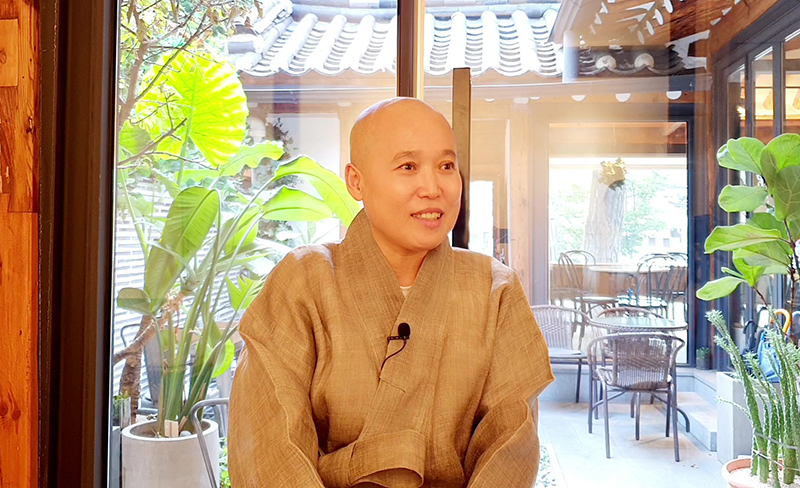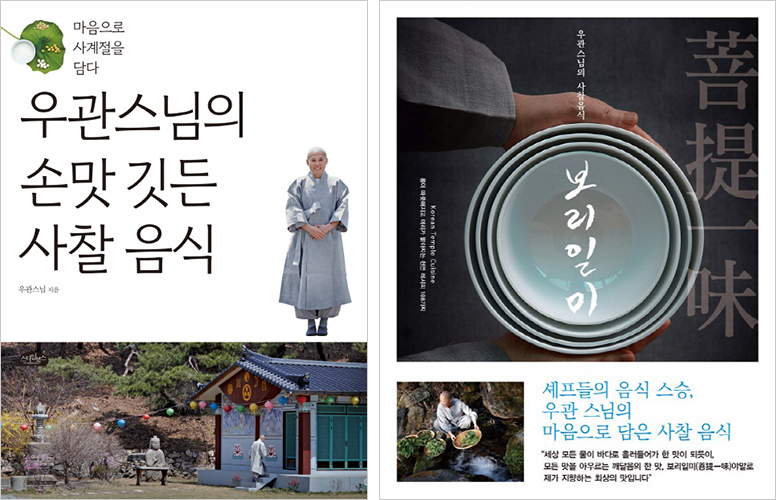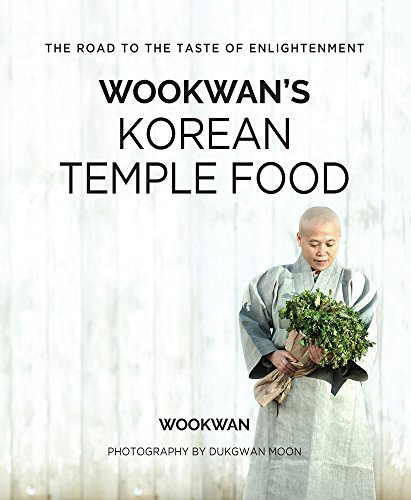|
Wookwan Sunim Introduction to Korean temple food
2019.09.09
'Where did this food come from?'
Wookwan sunim, you are the head sunim of Gameunsa and an author of temple food books. Usually when you think of Buddhist monks, you picture their asceticism for enlightenment. It must have been a difficult decision to publish cookbooks as an author given this fact.
While I was giving lectures at Dongguk University (a South Korean university established by Buddhist institutes) in 2012, a publisher approached me about writing a book. I hesitated when I first received the offer because I thought it was shameful for one in my position to write a cookbook when I was supposed to write poems from the heart about enlightenment. However, at the end of my hesitation, I decided to write a cookbook, and because I thought it would be my first and last, I tried to include as many recipes as I could. Therefore, my first book, Wookwan Sunim's Temple Food with a Mother's Touch (Stylebooks) ended up this thick book with over 230 recipes.
After publishing my first book, I changed my thinking to focus on communicating with
Three years after the publication of your first book, your second book Wookwan Sunim's The Tsate of Awakening (Lamp on the Moon) was released in 2016. You must have had a change of heart after publishing your first book.
Three years following the release of my first book, two publishers approached me about another book, and I was contemplating what to do. Around that time, the photographer who helped me with my first book, Moon Duk-gwan, requested he wanted to publish a temple food book with me at his newly established publishing company. I trusted him and his work and agreed. Also, after publishing my first book, I changed my thinking to focus on communicating with people of the world through my lectures and ended up joyfully working on my books because I realized they were what the world and its people wanted, and it was useful to them.
Wookwan Sunim's Temple Food with a Mother's Touch , Wookwan Sunim's The Tsate of Awakening
The two books we mentioned, Wookwan Sunim's Temple Food with a Mother's Touch and Wookwan Sunim's The Tsate of Awakening were both books on temple food released in South Korea. Although they have the same theme that is temple food, I am guessing there is a difference in the message you are sending to readers. What are the meanings the books have?
When I first released Wookwan Sunim's Temple Food with a Mother's Touch, I introduced ingredients that were easy to come by for most people and easy cooking methods. It was because I wanted people to have healthy food on their table they could make easily, and through that, they could improve their eating habits. Wookwan Sunim's The Tsate of Awakening was the opposite: it had ingredients that were hard to find. I wanted to tell people some grasses that could easily be seen in the mountains were not blades to be trampled but rather, healthy ingredients for food that were edible.
Temple food is not just about chasing after flavor and eating it,
We are aware that you take part in lectures quite often inside and outside South Korea to teach temple food. Temple food can't be limited to just cooking style, so it must be difficult to describe. How do you describe temple food to overseas audiences?
Temple food is not just about chasing after flavor and eating it. One should be thankful for the effort that went into bringing the ingredients to them and cook it with minimum seasoning with no thoughtless waste created. It is a meal to be thanked and shared with others. It is an ascetic practice; it is frugal food, and it is equal for all. We stress three virtues when cooking it. These would be cleanliness, flexibility and adherence to teachings when it comes to ingredients or cooking style. Only when the person who does the cooking and the person who eats the food has all three of these virtues does the food become useful to the mind and body.
In May 2018, your first English cookbook Wookwan's Korean Temple Food was published in the United States. We're curious about the story behind that cookbook.
In 2010, the cultural department of the Jogye Order in South Korea sent me to New York to spread awareness on Korean Buddhism at the '2010 Experience Korean Cuisine' event. I was there as a temple food expert. At that time, I visited the Culinary Institute of America (CIA) and also stopped by their library. It was saddening to see there were almost no Korean cookbooks. It occurred to me that I should write a book on Korean food and temple food. Time passed, and I was back in New York at the invitation of the Korean Cultural Center there in December 2017. There someone who worked with temple food offered me a deal on an English cookbook. I had always thought of this as an undertaking I would have to do eventually since that visit to the CIA in 2010, and there was no hesitation then. We moved quickly, and the book was published in May 2018. The book not only has recipes but also brings together the mentality and philosophy of temple food. I also tried to introduce the most symbolic and basic temple food there is.
Wookwan's Korean Temple Food
We are quite proud of the fact that you were able to highlight Korean temple food in the United States. However, many there are likely unfamiliar with the topic. What was the reaction like in the United States?
I was aware that various people were interested in temple food after it was introduced in the United States and Europe, but the reaction was palpable only after I held a book concert in the United States and the United Kingdom. I felt my work had been worthwhile when people came to me and thanked me for introducing recipes that were easy to follow. There were even three to four people who said I should open temple food restaurants with them in Manhattan. (laughs)
I was grateful and thankful that people who had no connection to me
In April 2019, Wookwan's Korean Temple Food was awarded the silver medal at the Benjamin Franklin Awards at the IBPA under the cookbook category. The thought you put into the cookbook must have touched them. How did you feel?
I was grateful and thankful that people who had no connection to me appreciated my work as I had written the book with my utmost efforts in mid-winter. I would like to offer a word of gratitude for everyone who now shares that beautiful relationship with me.
You are an ascetic, and as part of your asceticism, you are taking part in a number of activities to spread the word on the meaning inside temple food. Among those, publishing books is an excellent way to disseminate your thoughts. Please tell us about your personal philosophy or faith that you include in your books.
It's difficult to include much philosophy or faith in cookbooks, but the difference in cooking techniques can be an act of faith. In my everyday life, I cut out the complicated and cumbersome and live simply. As a result, my attitude towards food is also simple. With ingredients that are in season and easy cooking techniques combined with the right seasoning, you can be free of the complications of cooking, even just a little bit. In addition, if you add sincerity into your food, your table will be one to keep your family and neighborhood sustained.
Are there more books planned? What kind of books would you like to write next?
They say one's habits at age three stay with you until 80. Your tastes when you are young are saved in your mind until you become an adult. Palates at a very young age, as an infant or child, are very important so I am now thinking of a cookbook about feeding infants, toddlers and children. This is in order for them to become accustomed to healthy food so they can have healthy eating habits as adults. I would also like to write a book for those who are suffering from illnesses like high blood pressure and diabetes so they can have healthy eating habits. And I also have a small dream of publishing a poetry collection someday.
Arranged by Jeon Hye-young
|
Pre Megazine
-

Jakkajungsin Publishing Co.
VOL.69
2024.04 -

Writer Yun Jung-Eun
VOL.69
2024.04 -

Jumping Books Publishing House
VOL.68
2024.03 -

Writer Kim Hwa-Jin
VOL.68
2024.03 -

Publisher Hyohyung
VOL.67
2024.02 -

Writer Minha
VOL.67
2024.02 -

Almond Publishing
VOL.66
2024.01 -

Writer Kwon Jung-Min
VOL.66
2024.01 -

Hakgojae Publishers
VOL.65
2023.12 -

Writer Kim Hye-Jung
VOL.65
2023.12 -

Eidos Publishing House
VOL.64
2023.11 -

Writer Hwang In-Chan
VOL.64
2023.11 -

Munhakdongne
VOL.63
2023.10 -

Writer Chang Kang-myoung
VOL.63
2023.10 -

Happywell Publishing
VOL.62
2023.09 -

Writer Baik Soulinne
VOL.62
2023.09 -

Dasan Contents Group (Dasan Books)
VOL.61
2023.08 -

Writer Lim Kyoung-Sun
VOL.61
2023.08 -

SpringSunshine Publishing Co.
VOL.60
2023.07 -

Writer Lee Kyung-Hye
VOL.60
2023.07 -

Human Cube
VOL.59
2023.06 -

Doctor Jeong Jae-Seung
VOL.59
2023.06 -

Anonbooks
VOL.58
2023.05 -

Writer Son Bo-Mi
VOL.58
2023.05 -

Namhaebomnal
VOL.57
2023.04 -

Writer Kim Bo-Young
VOL.57
2023.04 -

Hugo Publishing
VOL.56
2023.03 -

Writer Cho Kwang-Hee
VOL.56
2023.03 -

Balgeunmirae Publishing Co.
VOL.55
2023.02 -

Writer Lee Byung-Ryul
VOL.55
2023.02 -

Wisdom House, Inc
VOL.54
2023.01 -

Writer Jeong Jia
VOL.54
2023.01 -

Humanitas
VOL.53
2022.12 -

Writer Kim Yeon-Su
VOL.53
2022.12 -

Songsongbooks
VOL.52
2022.11 -

Writer Eun Hee-Kyung
VOL.52
2022.11 -

Bombom Publishing Co.
VOL.51
2022.10 -

Writer Jiwon Yu
VOL.51
2022.10 -

Hangilsa Publishing Co., Ltd.
VOL.50
2022.09 -

Writer Kim Won-Young
VOL.50
2022.09 -

Moksu Publishing Company
VOL.49
2022.08 -

Writer Yoo Sun-Kyong
VOL.49
2022.08 -

Next Wave
VOL.48
2022.07 -

Writer Park Sang-Young
VOL.48
2022.07 -

A Thousand Hopes
VOL.47
2022.06 -

Writer Bora Chung
VOL.47
2022.06 -

Woongjin ThinkBig
VOL.46
2022.05 -

Dr. Oh Eun-Young
VOL.46
2022.05 -

JECHEOLSO Publishing House
VOL.45
2022.04 -

Writer Jang Ryu-Jin
VOL.45
2022.04 -

Changbi Publishers
VOL.44
2022.03 -

Writer Kim Ho-Yeon
VOL.44
2022.03 -

Mati Books
VOL.43
2022.02 -

Writer Lee Kkoch-Nim
VOL.43
2022.02 -

Picturebook Gongjackso
VOL.42
2022.01 -

Writer Kim Sang-Wook
VOL.42
2022.01 -

Writer So-yeon Park
VOL.42
2022.01 -

Writer Yoo Eun sil
VOL.42
2022.01 -

Kungree Press
VOL.41
2021.12 -

Writer Kim Lily
VOL.41
2021.12 -

Writer Park Yeon-jun
VOL.41
2021.12 -

Writer Yi Hyeon
VOL.41
2021.12 -

A deeper world told through picture books 'Iyagikot Publishing (Story Flower)'
VOL.12
2019.06 -

Author Jeon Min-hee
VOL.12
2019.06 -

Illustrator Kim Hwan-Young
VOL.13
2019.07 -

Travelers sailing through the sea of knowledge - 'Across Publishing Group Inc.'
VOL.13
2019.07 -

Genre Novel Publisher 'Arzak Livres'
VOL.14
2019.08 -

Author Lee Yong-han
VOL.14
2019.08 -

Wookwan Sunim
VOL.15
2019.09 -

East-Asia Publishing
VOL.15
2019.09 -

Author Jo Jung-rae
VOL.16
2019.10 -

EunHaeng NaMu Publishing
VOL.16
2019.10 -

Writer Heo Kyo bum
VOL.40
2021.11 -

Writer Kim So-Young
VOL.40
2021.11 -

Author-illustrator Kim Sang Keun
VOL.40
2021.11 -

ACHIMDAL BOOKS
VOL.40
2021.11 -

Author Kang Gyeong-su
VOL.17
2019.11 -

Moonji Publishing Belongs to the Literary Community
VOL.17
2019.11 -

Author Kim Yun-jeong
VOL.18
2019.12 -

I-Seum
VOL.18
2019.12 -

Kim Cho-Yeop
VOL.19
2020.02 -

Creating a window into the future with books
VOL.19
2020.02 -

Author Serang Chung
VOL.20
2020.03 -

Hey Uhm
VOL.20
2020.03 -

Writer Lim Hong-Tek
VOL.21
2020.04 -

BIR
VOL.21
2020.04 -

Writer Song Mikyoung
VOL.39
2021.10 -

Author-illustrator Kim Dong Su
VOL.39
2021.10 -

Writer Lee Seula
VOL.39
2021.10 -

Tabi Books
VOL.39
2021.10 -

Writer Kim Soo-hyun
VOL.38
2021.09 -

Author-illustrator Lee Myoung Ae
VOL.38
2021.09 -

Writer Hwang Sunmi
VOL.38
2021.09 -

Kidari Publishing Co.
VOL.38
2021.09 -

Writer Sohn Won-Pyung
VOL.22
2020.05 -

Woods of Mind's Books
VOL.22
2020.05 -

Writer Heungeul
VOL.23
2020.06 -

Gloyeon
VOL.23
2020.06 -

Maumsanchaek
VOL.24
2020.07 -

Winners of the 2021 Bologna Ragazzi Award
VOL.37
2021.08 -

Picture book artist Lee Suzy
VOL.37
2021.08 -

Author-illustrator Yi Gee Eun
VOL.37
2021.08 -

Hubble
VOL.37
2021.08 -

Writer Baek Se-Hee
VOL.25
2020.08 -

Bearbooks Inc.
VOL.25
2020.08 -

Author Baek Hee-Na
VOL.26
2020.09 -

Yuksabipyoungsa
VOL.26
2020.09 -

Writer Kang Hwa-Gil
VOL.27
2020.10 -

Kinderland (Bandal)
VOL.27
2020.10 -

Writer Ha wann
VOL.36
2021.07 -

Author-illustrator Myung Soojung
VOL.36
2021.07 -

Writer Jung Yeo-Wool
VOL.36
2021.07 -

Publisher EcoLivres
VOL.36
2021.07 -

Writer Lee Geumi
VOL.28
2020.11 -

Sakyejul
VOL.28
2020.11 -

Writer Kim Keum-Hee
VOL.29
2020.12 -

Geulhangari
VOL.29
2020.12 -

Writer Cheon Seon-Ran
VOL.30
2021.01 -

Hyang Publishing House
VOL.30
2021.01 -

Writer Lee Hee-Young
VOL.31
2021.02 -

Sanzini
VOL.31
2021.02 -

Publisher Prunsoop
VOL.32
2021.03 -

Writer Sim Yun-Kyung
VOL.32
2021.03 -

Hanbit Media
VOL.35
2021.06 -

Hyeonamsa
VOL.33
2021.04 -

Author-illustrator Noh Inkyung
VOL.33
2021.04 -

Writer Cho Won-Jae
VOL.35
2021.06 -

Writer Kim Jung-Mi
VOL.34
2021.05 -

Safehouse Inc.
VOL.34
2021.05












